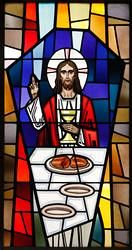Understanding the Feast of Corpus Christi
Friday, May. 27, 2016

CNS photo/Gregory A. Shemitz, Long Island Catholic
+ Enlarge
Jesus at the Last Supper is depicted in a stained-glass window at St. Francis of Assisi Church in Greenlawn, N.Y. The feast of the Most Holy Body and Blood of Christ, also known as the feast of Corpus Christi, is celebrated June 5 in the U.S. this year.
By Father Samuel Dinsdale
Pastor, St. Marguerite Parish
Corpus Christi ain’t just a town in Texas. It is what we celebrated this Sunday. How Catholics understand this holiday informs our understanding of God and each other.
Last January, at a liturgical conference in San Antonio that I attended, a breakout session covered this topic. The presenter correctly stated that Jesus was not physically present in the bread and wine (meaning the bread and wine does not become his actual human flesh and blood when Jesus was doing his ministry before his death); however, He is sacramentally present (meaning his glorified body after the resurrection is present) in the Eucharistic elements. After the presenter said this, the class was over although we had 20 minutes to go, because some folks who didn’t get his theological nuance felt they had to defend the doctrine of the real presence.
Many times when we have a heated debate it involves a misunderstanding of the meaning of the words. To emphasize Jesus’ real presence in the Sacrament of the Eucharist, people may be taught that the Eucharistic feast is comparable to cannibalism. However, we believe that glorified Jesus is present, and when communicants receive the Body and Blood of Christ, they receive Him, Body and Blood, Soul and Divinity. The timeworn question is that if a mouse were to chew on the reserved consecrated host in the tabernacle, does the mouse receive its First Communion? The answer is no, because the mouse doesn’t have faith and, to the best of its knowledge, is just chewing on bread. The sacrament retains its validity, but for the communicant to have an encounter or communion with our risen Lord, the person must know what he or she is doing, and to believe.
As Catholics, we say “and” a lot. Each of the seven sacraments communicates God’s love for us. When we say “Body of Christ,” we could mean the bread and the wine that is consecrated at Mass, or we could mean all of those who are baptized (not just Roman Catholics) in the name of the Trinity. To be more exact, the mystical body of Christ would be all of the baptized. This definition changed some time in the Middle Ages, since originally the mystical body of Christ was the Eucharistic elements and the community was the Body of Christ in the world. Sister Sharon McMillan, SND explained in our sacramental theology class at seminary that this was when the Church shifted her emphasis of being a member of the community of faith to the centrality of Eucharistic elements and the focus on cultic worship.
At Mass, we receive Christ in the proclamation of the Word (the readings from the Old Testament and New Testament), our encounter with the other folks, the consecrated bread and wine that is his Body and Blood, and the prayers and blessings. People have told me that the only reason they come to Mass is to receive the Eucharist. This attitude is manifested in the behavior of some: They consistently arrive late, sit in the back pews, don’t sing, don’t give a hearty response, don’t acknowledge those around them, leave just after receiving communion, and they certainly don’t stay for coffee and doughnuts. They have a difficult time getting something out of the liturgy.
On the other side there are those who are non-Eucharistic Catholics. They are friendly, help out, and some have parish leadership positions, but they never or rarely come to Mass. While I can understand the former group of folks who attend but do not participate, because this is largely from the pre-Vatican II mindset (and they were largely trained this way), I don’t understand the folks who never come to Mass but who volunteer and may be on any number of boards or committees. Mass is central to the Catholic faith, and we are required to attend on Sundays.
Being Catholic is like yoga. One practices but never perfects; however, we always must be pushing ourselves deeper into the pose. We develop an interior life through private and communal prayer. We are called to perform works of charity and justice, which requires us to put our money where our mouths are by doing things in the real world that help others. We are to form our minds by paying attention to what the pope and the bishops are teaching, and through study of the Bible and books on theology. We are to receive the blessings of Christ through the sacraments, and we are to be the Body of Christ in the world by participating with God by following our Christian vocation to change the world and to make it into the Kingdom of God, the kingdom of peace, justice and love.
For questions, comments or to report inaccuracies on the website, please CLICK HERE.
© Copyright 2024 The Diocese of Salt Lake City. All rights reserved.
© Copyright 2024 The Diocese of Salt Lake City. All rights reserved.

Stay Connected With Us